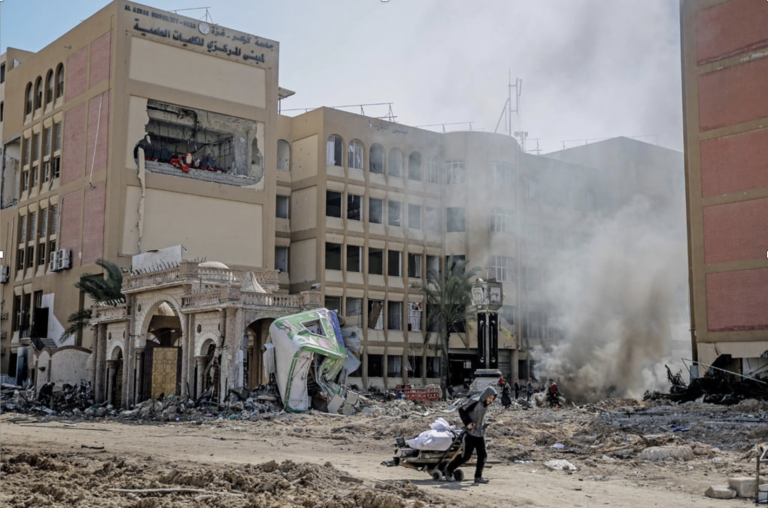by Andrea Tucci,
For the 2,300,000 inhabitants of the Strip before the war there were more than eight hundred schools and seventeen higher education institutions in the Gaza Strip, including at least six universities, now they are almost all completely destroyed.
Israeli ground troops first began occupying and using Palestinian university buildings as military posts, then filled them with hundreds of mines and blew them up.
There was no military threat emerging from the buildings, the army’s intent was pure elimination, for the sake of it.
Some 281 public schools, and 65 UN schools were completely destroyed or damaged. In other words, the Palestinian space of education in Gaza has been erased.
The Israeli offensive not only razed hundreds of schools, and universities, but also killed many educated people: students, young professionals, cultural personalities, teachers, and university professors. The social fabric has been dismantled, and a society has been destroyed, so much so that we can speak of “Sociocide”
The foundations of knowledge have been razed to the ground.
In fact, it will be about restoring not only the physical space, but also the skills, and academic training.
The British Society for Middle Eastern Studies (Brismes) reported how, since the attacks began in October, Israeli academic institutions have cracked down on academic freedom, and free speech by suspending, investigating, and expelling students for expressing solidarity with the Palestinian people.
Some Israeli colleges, such as the Gaza David Yellin Academic College, and the Achva Academic College, have suspended or fired some of their professors who had allowed themselves to express solidarity with Gaza. In an open appeal, Palestinian academics called on their colleagues abroad to take action against the sociocide, and the destruction of educational institutions. But how did the Israeli academic world react to the extermination of its colleagues, and the unprecedented destruction of educational infrastructure? So far we have not heard any institutional condemnation.
For a long time, Gaza, and the West Bank had one of the highest literacy rates in the Arab world, despite decades of occupation, and the seventeen-year blockade of the Strip. In September 2023 it was 98 percent, according to the Palestinian Central Bureau of Statistics, figures comparable to those of the rich Gulf states. Illiteracy had fallen from 13.9 percent in 1997 to 2.2 percent in 2023.
Education was one of the first sectors ceded by the Israeli administration to the Palestinian one with the Oslo agreements of 1994, and was of great importance for society.
Gaza’s universities offered degree courses in various disciplines, and many graduates, despite the restrictions, managed to complete doctorates in the West and then return to work in the Strip.
Educational infrastructure will have to be completely rebuilt, and the “The Global Education Cluster,” estimates a cost of at least $855 million.
Another uncertainty is the fate of UNRWA, the largest UN agency active in Gaza, which deals with Palestinian refugees, and managed 183 schools with around 300 thousand students. After Israel had accused about ten of its operators (out of a total of 13 thousand employees) of having played a role in the attacks of 7 October. The funding that UNRWA was receiving was frozen by the US, the UK and other EU countries.
According to the British Society for Middle Eastern Studies, “brain drain” caused by death and destruction is expected.
Even if a ceasefire is reached, the task of rebuilding Gaza’s educational system, the foundation for any future development, is colossal.
Benjamin Netanyahu has promised that there will be no reconstruction before the “demilitarization of Gaza”, and a “general de-radicalization program” in both education, and religion. However, it is feared that he will probably get the exact opposite: that is, more resistance, and more radicalization..
It is very likely that many of those who survived, after their entire family was killed, will not forget and will not forgive…
Photo: University of Al-Azha, Gaza




